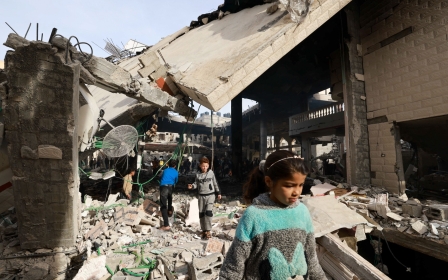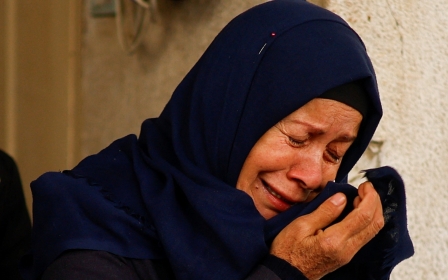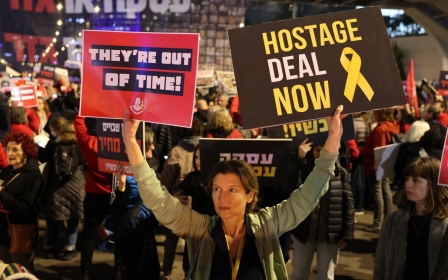War on Gaza: Rafah ground invasion raises fears of aid collapse and ethnic cleansing
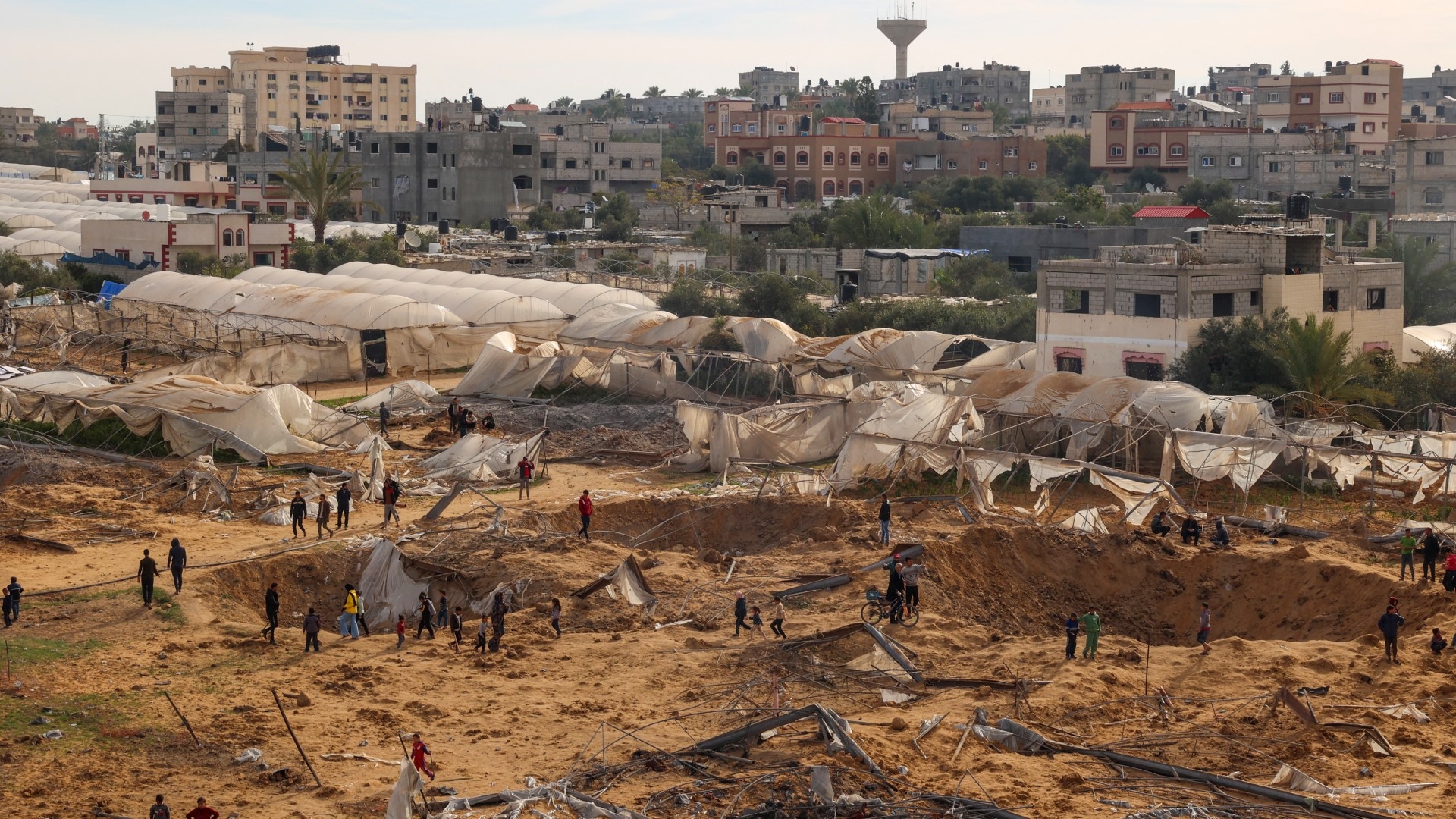
An Israeli ground invasion of Rafah - the most densely populated area in Gaza - appears imminent, days after a devastating night of air strikes on the southern city.
At least 67 people were killed after Israeli air forces struck 14 homes and three mosques on Monday.
The population of Rafah - which spans just 64 sq km - has increased fivefold since war broke out on 7 October. It is now home to 1.5 million displaced Palestinians.
The majority of them are living in makeshift homes and tents, after being forcibly ejected by Israel from northern and central areas of Gaza in recent months.
In an interview with ABC News on Sunday, Israeli Prime Minister Benjamin Netanyahu reiterated his intent for an imminent ground incursion on the area.
New MEE newsletter: Jerusalem Dispatch
Sign up to get the latest insights and analysis on Israel-Palestine, alongside Turkey Unpacked and other MEE newsletters
"We’re going to do it. We’re going to get the remaining Hamas terrorist battalions in Rafah," he said.
He added that it would be done while providing “safe passage for the civilian population”, details of which he said Israel was "working out".
When pressed where those supposed safe areas were, he pointed towards "plenty” of areas “that we’ve cleared north of Rafah”.
But aid workers insist that no such safe zones exist in the besieged, bombarded enclave.
Displaced Palestinians have gathered in camps across Rafah
Drag the button to see the new camp sites
"There hasn't been a safe place for Palestinians for months," Ahmed Bayram, the Norwegian Refugee Council’s regional media and communications adviser, told Middle East Eye.
"Even Rafah had come under bombardment repeatedly. The safe routes and zones that Israel unilaterally designated as it announced relocation orders have seen bloodshed and repeated attacks."
"Civilians have exhausted all options. Rafah was their last resort and now there is nowhere safe to flee to."
Invasion 'breaks ICJ order'
Hassan Ben Imran, an international law expert and board member at Law for Palestine, said a Rafah ground invasion would breach the provisional measures the International Court of Justice (ICJ) ordered Israel to abide by last month.
“[An invasion] would definitely mean Israel is breaking the ICJ order, more so than before, because this area is supposed to be a safe zone,” he told MEE. "Invading that territory means you are going to be invading the camping sites where people are building their tents."
He added that such a land operation could only be understood under Article 2c of the Genocide Convention, which prohibits deliberately inflicting conditions that bring about partial or full destruction of a national, ethnic or religious group.
'Urgent international action is needed to avert this latest catastrophe facing civilians and healthcare in Gaza'
- Medical Aid for Palestinians spokesperson
Among the measures ordered by the interim ICJ ruling was to refrain from obstructing the delivery of aid into Gaza and to improve the humanitarian situation.
"Amidst insufficient aid supplies crossing Rafah, Israeli bombardment of areas close to aid operations put the entire aid system at risk of suspension and collapse," said Bayram.
"Israeli operations have drawn nearer to heavily populated shelters. We are fearing the worst if Israel's plan goes ahead."
He added that aid workers were now at risk of being cut off from the Rafah crossing between Gaza and Egypt, which has provided the only humanitarian lifeline for Palestinians under siege.
The Kerem Shalom crossing between Israel and Egypt, meanwhile, has been closed for extended periods during the war.
“We are looking at a scenario where aid workers are forced to leave areas where the needs are so high at this critical time,” Bayram said.
A spokesperson for Medical Aid for Palestinians, a UK-based charity offering medical services in Gaza, said a ground invasion would lead to the "killing and injuring of more civilians".
"There are only a handful of hospitals in Rafah and they are already overwhelmed by the influx of injuries resulting from Israel’s ongoing indiscriminate bombardment," they told MEE.
"Urgent international action is needed to avert this latest catastrophe facing civilians and healthcare in Gaza."
Fears of 'second Nakba'
With no safe zones any more - despite Netanyahu’s claims about safe areas north of Gaza - Palestinians fear that displacement from Rafah, the southernmost point in the enclave, could come in the form of being forcibly ejected into Egypt’s Sinai province.
Palestinians from Gaza have previously told MEE that proposals to create a humanitarian corridor between Gaza and Egypt’s Sinai were akin to a “second Nakba”, alluding to the mass displacement of 750,000 Palestinians in 1948.
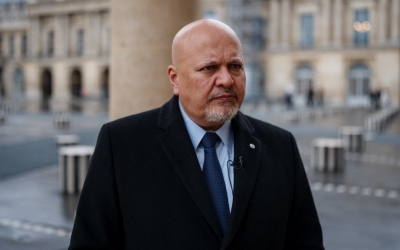
In a thread on X, formerly known as Twitter, humanitarian law consultant Itay Epshtain argued that the Rafah offensive could be part of plans to “forcibly deport” Palestinians.
He referenced an Israeli military intelligence report from October which outlined four stages of the war: vacating northern Gaza for a land invasion; ground operations from north to south; opening routes from Rafah to Egypt; and finally, establishing tent cities in northern Sinai to resettle Palestinians.
“Stage 3 is operationalised at present, and may very well lead to Stage 4,” Epshtain wrote on X.
Egyptian officials are wary that a land operation would force Palestinians towards the border with Egypt.
Footage posted on social media over the weekend showed Egyptian security forces fortifying the fence separating Egypt and the Gaza Strip with barbed wire. Reuters also reported on Friday that Egypt had deployed 40 tanks and armoured personnel carriers to Rafah to bolster security around the border.
Ben Imran from Law for Palestine said: “Egypt is not an option. Moving the people into Egypt is ethnic cleansing.”
He said that if Israel wanted to create a safe passage for civilians, it needed to open the Erez crossing into Israel.
“Let these people come into those territories until the fighting is over,” Ben Imran said.
“At the end let's not forget that 80 percent of the people of Gaza are originally from the surrounding cities which make up the state of Israel.”
Middle East Eye delivers independent and unrivalled coverage and analysis of the Middle East, North Africa and beyond. To learn more about republishing this content and the associated fees, please fill out this form. More about MEE can be found here.


